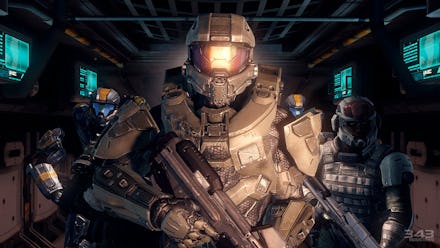Your favorite male video game characters are boring, one-dimensional stereotypes

You've heard the arguments about female video game characters and how they're usually reduced to stereotypes, right? News flash: Their male counterparts usually aren’t any better.
Halo, one of the most popular first-person shooters of all time, features a hero whose face you never see in-game. His ultra-bland name, John-117, reflects exactly what he is: one of many. One of many super-soldiers, no less, but in a series of drab avatars, each tweaked a bit to fill the next new role.
As much as I love Halo, I can step outside of Master Chief and acknowledge that his background is quite rote.
This problem isn't specific to male or female characters. It's a narrative issue in general for video games, one that’s in dire need of repair. A good portion of male characters in games are boring, typical stereotypes, and the sooner everyone realizes this the better. It's OK to love them, but it's also OK to ask for improvement.
A universal problem
Like women in games, men are often written to fill tropes that have existed in fiction for years. It's not malicious, but it is formulaic, and for every "femme fatale," there are a dozen more cookie-cutter male characters thrown into games without a second thought.
You've got your cocky adventurer, your rugged journeyman, your silent assassin, your gorgeous JRPG lead, your gung-ho soldier, your space marine and your generic everyman — just to name a few. These types are some of the building blocks writers lean on to create familiar stories that will sell.
It makes sense, but it's a bit disrespectful to the players, who still value rich storytelling — and to the characters, too, who deserve a real sense of purpose and uniqueness to set them apart.
Breaking down the stereotypes
The Uncharted series' Nathan Drake is the quintessential cocky adventurer type, with enough quippy dialogue to last him several lifetimes. He's an Indiana Jones for the modern age, with the roguish, bad-boy charm to seem dangerous enough to be interesting. Uncharted 2: Among Thieves is exemplary for the genre, but that's not because of Drake. Little distinguishes him from just about any other male lead, other than the fact that his face is plastered all over the marketing materials. It's not like Uncharted's Elena or Chloe are any better, but Drake fits the adventurer stereotype to a T.
Yawn.
Gears of War's Marcus Fenix fills the gung-ho soldier trope quite nicely. He's got his own reasons for fighting throughout the core Gears of War trilogy, but he's everything a typical soldier character usually is: rough around the edges, tough, wise-cracking and the point guy for even the toughest missions. He is how you'd want the commander of your squad to be in that type of situation. He's a perfectly capable character. But none of this makes him particularly inventive or interesting.
Deus Ex: Human Revolution's Adam Jensen is the silent assassin/hacker type. He's got his own back story, as is required, but he still ticks all the checkboxes off for the archetype: cool, collected and clad in black, with a massive chip on his shoulder. He never asked for this, you know.
A 'Chief' complaint
We've got to come back to Halo's Master Chief as a great example of the space marine trope. Separated from the context of the Halo franchise, he's hardly engaging on his own because, despite a few minor details that the writers fill in for us, we've met him thousands of times before in other games and movies. There’s nothing unique left for us to discover or care about.
John-117 was groomed from childhood to be a part of the SPARTAN-II program. From his gifted childhood to his adulthood as a one-liner-spouting military machine, his story has always been one of excellence. Though he's powerful, he's also extremely bland in his perfection. He possesses interesting traits in the context of the Halo games, but they're just not as meaningful outside of that context.
If you don’t choose to look beyond Halo and dig into its lore by way of the novels, comics and other media, you certainly wouldn’t know much about him.
Creators are afraid to challenge the status quo
It’s easy to see why these issues still pop up. Creators aren't particularly interested in challenging or changing the status quo because right now, it's working for them. Why fix what isn't broken? These blank slates and interchangeable characters are meant for players who feel the need to project themselves onto the game lead. So why bother with nuance or complexities?
It's not something that's going to change overnight. First people have to recognize there's an issue beyond diversity and inclusivity: blandness. Just like an emphasis on keeping women clothed and "decent" doesn't equate to interesting female characters, ensuring men are burly brutes with sarcastic quips reinforces the same problem.
Male character tropes, just like female tropes, are bland and uninspiring. We need to confront the culture and industry trends that reward unoriginality. It's time writers start challenging the preconceived notions of what's acceptable for male characters and what isn't.
More gaming news and updates
Check out the latest from Mic, including our list of video games that made fun of their players, a personal essay about dealing with anxiety through Breath of the Wild, a look at the racist and sexist experiences in eSports and a plea for better character customization options for black characters.